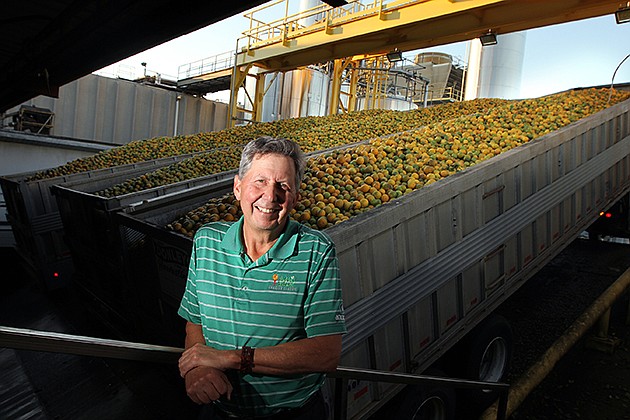- November 24, 2024
-
-
Loading

Loading

Bob Behr is an unassuming and methodical executive, a behind-the-scenes kind of leader.
But his public profile is about to grow.
An Orlando native, Behr was named CEO of Lake Wales-based juice processing cooperative Citrus World, makers of Florida's Natural juice products, in September. The co-op is owned by 14 organizations that represent about 1,000 Florida orange and grapefruit growers. Almost all of its juice is sold with the Florida's Natural label, and members receive a share of profits on the sales. Florida's Natural is the third-largest orange juice brand in the United States, and the only one made using strictly fresh Florida citrus.
Behr, with a doctorate in agricultural economics, was the CFO at Florida's Natural for two decades; he replaces former CEO Steve Caruso, who retired. The promotion comes during a difficult stretch in the orange juice industry that's also somewhat of a paradox for Florida's Natural. On one side the co-op, which includes the Dundee, Haines City, Lake Wales and Winter Haven growers' associations, in addition to another 60,000 acres, posted record profit shares for its grower members in the 2014-15 season.
That isolated success masks a bigger issue: citrus greening, a deadly disease that threatens the entire existence of the state's citrus industry. Scientifically known as huanglongbing (HLB), citrus greening infects and eventually kills trees but until then produces deformed and bitter fruit. It's spread by the Asian citrus psyllid, a tiny insect, and its effects have caused a fruit shortage.
“The biggest challenge facing our industry today is fruit supply,” says Behr. “We need to solve the citrus greening problem to assure the long-term sustainability of our industry.”
The citrus greening issue has tentacles. For instance, growers have to be diligent in applying pesticides and fertilizer to guard against it. That has tripled the cost of care in the industry over the last 15 years, to about $2,200 an acre. Consumer's ever-changing habits in drinking and purchasing juice only exacerbates the industry challenges.
“The cost of growing citrus has gone through the roof,” says Behr. “The yields are down — there's less fruit per acre. Production has decreased for the industry and there's two sort of dynamics at work here: Production is shrinking and supply and demand is less.”
Behr and the Florida's Natural team are fighting to keep up profit levels. For one, Citrus World invested $10 million into a tree planting incentive program designed to help growers handle the increased cost and risk from citrus greening. The program includes 1 million new trees.
“The increase in new membership and our planting incentive program are examples of our efforts to assure an adequate fruit supply to meet our marketing requirements for the Florida's Natural brand,” Behr says. “Looking ahead, there has been increased interest in planting and replanting because of the new tools available to combat the greening disease.”
Behr also says Citrus World, founded in 1933, has the right mix of history and determination to overcome the industry obstacles. “The cooperative spirit of our founding members put Citrus World on the map,” Behr says, “and it's the same cooperative spirit that is the guiding principal behind the success of the Florida's Natural brand today.”